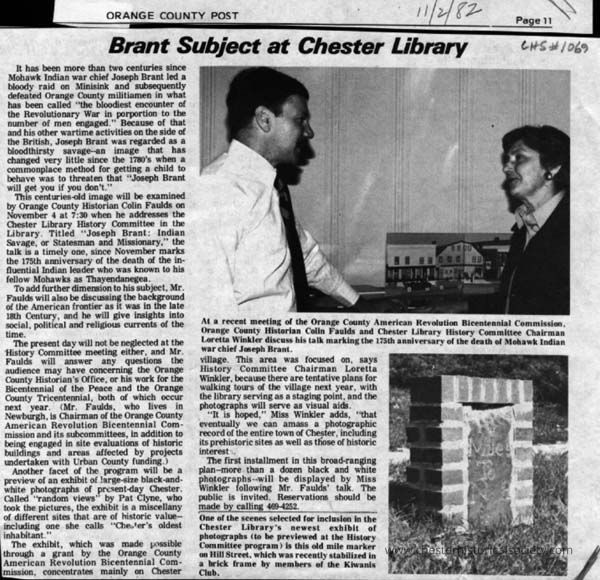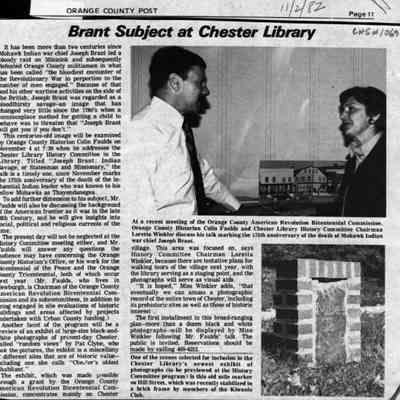Transcription
Brant Subject at Chester Library
It has been more than two centuries since Mohawk Indian war chief Joseph Brant led a bloody raid on Minisink and subsequently defeated Orange County militiamen in what has been called “the bloodiest encounter of the Revolutionary War in porportion to the number of men engaged.” Because of that and his other wartime activities on the side of the British, Joseph Brant was regarded as a bloodthirsty savage--an image that has changed very little since the 1780’s when a commonplace method for getting a child to behave was to threaten that “Joseph Brant will get you if you don’t.”’
This centuries-old image will be examined by Orange County Historian Colin Faulds on November 4 at 7:30 when he addresses the Chester Library History Committee in the Library. Titled “Joseph Brant: Indian Savage, or Statesman and Missionary,” the talk is a timely one, since November marks the 175th anniversary of the death of the influential Indian leader who was known to his fellow Mohawks as Thayendanegea
To add further dimension to his subject. Mr. Faulds will also be discussing the background of the American frontier as it was in the late 18th Century, and he will give insights into social, political and religious currents of the time.
The present day will not be neglected at the History committee meeting either, and Mr. Faulds will answer any questions the audience may have concerning the Orange County Historian’s Office, or his work for the Bicentennial of the Peace and the Orange County Tricentennial, both of which occur next year. Mr. Faulds, who lives in Newburgh, is Chairman of the Orange County American Revolution Bicentennial Commission and its subcommittees, in addition to being engaged in site evaluations of historic buildings and areas affected by projects undertaken with Urban County funding.)
Another facet of the program will be a preview of an exhibit of large-size black-and-white photographs of present-day Chester. Called ‘random views” by Pat Clyne, who took the pictures, the exhibit is a miscellany of different sites that are of historic value--including one she calls ‘Chester’s oldest inhabitant.”
The exhibit, which was made pssible through a grant by the Orange County American Revolution Bicentennial Commission, concentrates mainly on Chester village. This area was focused on, says History Committee Chairman Loretta Winkler. because there are tentative plans for walking tours of the village next year, with the library serving as a staging point, and the photographs will serve as visual aids.
“It is hoped,” Miss Winkler adds, “that eventually we can amass a photographic record of the entire town of Chester, including its prehistoric sites as well as those of historic interest•
The first installment in this broad-ranging plan--more than a dozen black and white photographs--will be displayed by Miss Winkier following Mr. Faulds’ talk. The public is invited. Reservations should be made by calling 469-4252
One of the scenes selected for inclusion in the
Chester Library’s newest exhibit of photographs (to be previewed at the Histor Committee program is this old mile marker on Hill Street, which was recently stabilized in a brick frame by members of the Kiwanis Club.
At a recent meeting of the Orange County American Revolution Bicentennial Commission, Orange County Historian Cohn Faulds and Chester Library History Committee Chairman Loretta Winkler discuss his talk marking the 175th anniversary of the death of Mohawk Indian war chief Joseph Brant.Transcriber
Clifton Patrick
